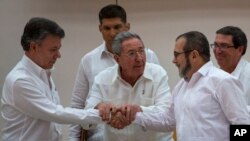Colombia's chief negotiator said Thursday that his government and FARC rebels would "definitely" meet a March 23 deadline for a peace agreement.
"We can say without excessive rhetoric that peace is about to break out in Colombia," Humberto de la Calle told reporters in Havana. "I think we have begun the countdown for war to die and life to win."
De la Calle said both sides had been instructed to speed up final negotiations and work hard to meet that deadline.
The government and rebels reached a major breakthrough Wednesday in talks aimed at ending more than 50 years of bloodshed. Colombian President Juan Manuel Santos and FARC commander Timoleon Jimenez, also known as Timochenko, met for the first time to say that the two sides had finally agreed on the touchy issue of justice for crimes committed by the rebels.
The matter had been the one major obstacle left in the three years of talks sponsored by Cuba and Norway.
The deal would grant a general amnesty to rebel fighters, except for those who had committed such serious offenses such as war crimes, rape and kidnappings. Rebels who confess to less serious crimes may not have to go to prison. They may instead have their freedom of movement restricted and be ordered to compensate their victims
FARC negotiators have always vowed to keep their fighters out of jail.
The agreement also orders rebels to disarm within 60 days of the signing of the deal. Details of how they will give up their weapons are still to be worked out.
"We are on different sides, but today we advance in the same direction, in the most noble direction a society can take, which is toward peace," Santos said Wednesday, minutes before a forced handshake with Timochenko.
Pope's visit
The surprise agreement after years of negotiations was achieved partly because of rebel efforts to make the announcement during the visit of Pope Francis to Cuba this week. Rebel negotiators worked through a final 20-hour session last Thursday to achieve this goal, people involved told The Associated Press.
"Without even being present physically in the room, the pope was a very important presence,'' said Douglass Cassel, a University of Notre Dame law professor who was one of three lawyers for the government who hammered out the final workings of Wednesday's agreement.
The agreement was announced a day after the pope left the communist-led island for the U.S. leg of his trip.
The FARC guerrillas had wanted to meet with the pope in Havana, but the Vatican made it clear that no such meeting would take place. Instead, Francis issued a broad appeal during his Sunday Mass in Cuba exhorting both sides not to let the best chance at peace in decades pass them by.
"Let's join efforts to achieve peace," Timochenko later posted on the rebels' Twitter feed.
An immediate test for success in implementing the deal will come in a referendum giving Colombians a chance to endorse or reject any deal, which must also clear congress. Foreshadowing what's likely to be a bitter political fight, conservative former President Alvaro Uribe called Wednesday's agreement a gift to the FARC, even before details were known.
"This is a bad example for society that will generate more violence,'' said Uribe, whose military offensive last decade winnowed the FARC's ranks and pushed its leaders to the negotiating table.
'Longing' for peace
Supporters, however, are optimistic.
"The most important court the agreement will face is the court of public opinion in Colombia,'' said Bernard Aronson, President Barack Obama's special envoy to the Colombian peace process. "There's a tremendous longing for peace after 50 years of war, and I'd be surprised if a final settlement didn't receive support.''
U.S. Secretary of State John Kerry hailed the deal as "historic progress" and expressed his "deep appreciation to Pope Francis for his moral leadership and the Vatican's good offices in the quest for peace."
The leftist FARC rebels have been fighting a guerrilla war to topple Colombian governments since 1964, and more than 220,000 people have died in the fighting. They have used drug trafficking and kidnappings to fund their war.
Some information for this report came from AP.





